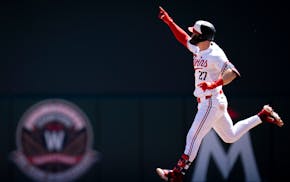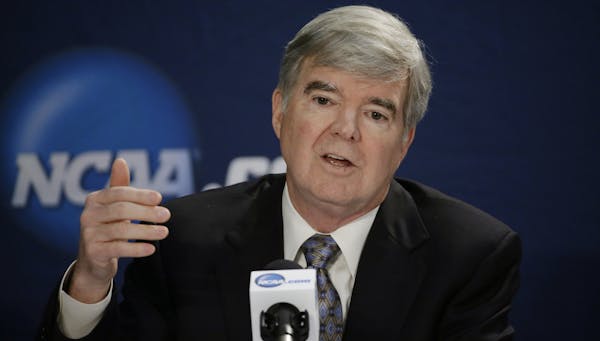The world of big-time college sports seemed miles away from Sea Foam Stadium when the Concordia football team recently punched its way through a biting April wind during a Sunday spring scrimmage in St. Paul.
So did the question of whether college athletes should be allowed to unionize.
The topic now scrolls regularly across the bottom of ESPN. But Jim Munkwitz, whose son Jake is a tight end at Concordia, had clearly given it some thought. "I'm not so sure about a union," he said. But "I think the Northwestern guys bring forth some valid concerns."
Many eyes will be on Northwestern in Evanston, Ill., when the school's football team votes Friday on whether to form a union, a move that could dramatically change the world of college athletics. The National Labor Relations Board has ruled that Wildcats players are employees of the school and eligible to form a union.
But the narrowly defined ruling, which Northwestern is appealing, is seen at the moment as applying only to football players at private colleges that offer athletic scholarships, and not at public universities such as the University of Minnesota.
Enter Concordia (St. Paul): A private Christian school with 1,344 undergraduate students, a college that offers athletic scholarships and plays NCAA Division II sports. Could the Northwestern ruling, should it stand, apply to Concordia?
The answers at the moment are murky — but the opinions are not. School officials, while wary of having student-athletes comment on the subject, acknowledge that they are closely watching what happens at Northwestern.
Ryan Williams, Concordia's fourth-year football coach, said the unionization push at Northwestern "doesn't make sense."
Hank Goff, a senior defensive end, wore a Concordia gray sweatshirt and nodded in agreement as he sat with his coach in a St. Paul restaurant. "It puts division in a team," he said. Goff added that his teammates have not discussed the issue because "we're too busy getting better, getting ready for next season." The Golden Bears, who finished 5-6 a year ago, will hold their annual spring game Saturday, a day after the Northwestern vote.
Unionization won't be quick
Even if Northwestern players vote to form a union, little is expected to change immediately. The legal fight to unionize, should the players vote to do so, could drag on for at least a year and include appeals by Northwestern to the full National Labor Relations Board, and also into federal court, said Laura Cooper, a University of Minnesota law professor specializing in labor law and arbitration.
But analysts have said the long-term consequences of a pro-union vote could dramatically change the game — and the costs to the school — by allowing players to bargain over medical coverage, compensation for commercial sponsorships and due process over rules violations.
Cooper added that — faced with a certified players' union — Northwestern could be forced to bargain with players over practice hours or dollar amounts of scholarships since each would be a "term or condition of employment."
She added that a Division II private school that offered scholarships also could face a union vote — if the school's athletes were seen as employees of the school because their sports schedules largely controlled their college life.
A little smaller level
Concordia is certainly not Northwestern. Athletic Director Tom Rubbelke oversees a $4.2 million budget; he said his recruiting budget for basketball totals $1,500. Of the school's 100 football players, roughly 70 receive some type of scholarship. Just one or two, added Rubbelke, get full athletic scholarships.
But Concordia does not operate in a vacuum from the big stage of college athletics. Rubbelke said some money from the NCAA's March Madness men's basketball tournament trickles its way to the Division II schools.
Rubbelke admitted he was reluctant to make his school's athletes available for interviews because they might say "the wrong thing. I don't want the student-athlete to come out and say, 'Oh, geez, I'd love to be unionized,' because he doesn't really know what that all means."
At a nearby Concordia softball game, Carol Lee watched her granddaughter Cassie Bertelsen play right field and groaned when the team let a two-run lead slip away and lost to Minot State 6-4.
"I am so anti-union," Lee said. What was happening at Northwestern, she said, was difficult to fathom: "I don't know understand how these kids' brains work."
Between games of a doubleheader against Minot State, the Concordia softball team pitched in and helped chalk the foul lines for the second game. Minot State players huddled in the team bus to keep warm. "If there's a lot of money being made, there's a valid argument" for a union, said Joe Meiser, who watched his daughter, Alicia, in center field. But Meiser said his views may be skewed because he is a union plumber.
He added: "It's not something that would probably work for Concordia [but] I don't know where you draw the line."
Phil Fandrei's father invented Sea Foam, the petroleum-based engine additive that spawned a successful company based in Eden Prairie. The Concordia football stadium carries the company's name, and the Fandrei Center stands on campus alongside the field. Only last week Phil Fandrei said he spoke to a business class at the school, and described to them "what success really is — and [that] it doesn't pertain to how much money you make."
Fandrei had a dim view of college athletes forming unions. "I'm totally appalled at even the thought of it," he said. "What are we getting to?"
Joey James has seen the big and little of college sports. As the interim men's basketball coach at South Dakota last season, James' team played — and kept up with — national power Kansas State in Decmber.
At a near-empty Buffalo Wild Wings last week, James was introduced as Concordia's new coach, hoping to put life in a team that finished 8-19.
James accepted the Golden Bears job while attending the Division I Final Four in Arlington, Texas, and came away amazed at what he saw. "The amount of money that goes into that has got to be absolutely off the charts," he said.
While James did not take a position on college athletes and unions, he said "Division I's getting out of hand" when it comes to big money. "That's where the whole unionizing comes in," he said. But at the D-II level — Concordia's level — it is "a little bit different playing field," James said.

Souhan: Even as winning streak ends, Jeffers continues to thrive
Zibanejad has 2 goals and 1 assist, Panarin scores as Rangers beat Hurricanes 4-3 in Game 1

Heim homers in the 9th and Lowe hits an RBI single in the 10th to lead Rangers past Royals 3-2

